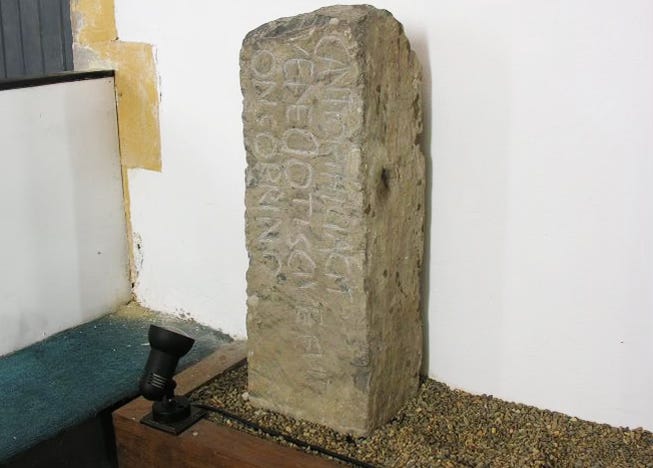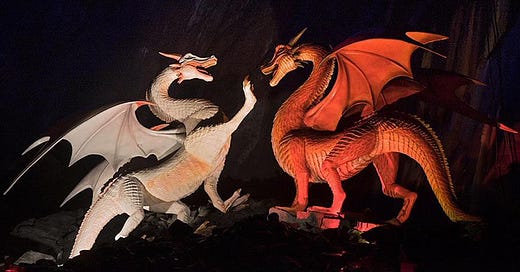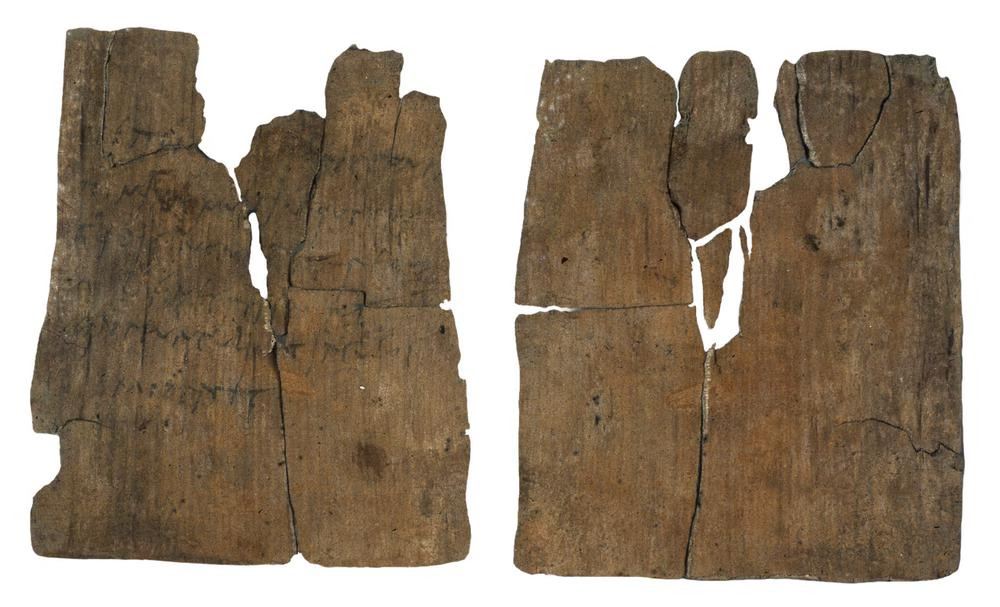The Welsh, the Cumbrians and the British
Where do the designations Cymry and Briton come from?
Politicians love nothing better than changing place-names. It’s much easier than building new schools or getting the trains to run on time. So it comes as no surprise to learn that there is now a push to rename Wales as Cymru in English. The most recent petition to the Welsh Parliament claims:
Wales is a name imposed on Cymru and is essentially not a Welsh word at all … Hardly anyone has heard of Cymru or realises that we have our own unique language and culture which is totally different from the other countries within the United Kingdom.
The English name Wales means ‘land of the Britons’ and Cymru means ‘land of the compatriots’. The term Wales derives from Old English Wealas ‘Britons’, but it has long been unclear why the term Cymru was adopted. The distinction between the Welsh and the English is still widely understood by Welsh nationalists to be symbolised by the red dragon fighting a white dragon in a pond in the vision of Ambrosius recounted in the Historia Brittonum and by Merlin in Geoffrey of Monmouth:
The red worm is your dragon and the pond is the figure of this world. But the white dragon is of that nation which has conquered the most peoples and regions in Britain, and will hold it almost from sea to sea.
The Welsh call themselves Cymry in their own language, a description that is first attested in the twelfth century – in the phrase breenhined hinn hatouyssocion cymry ‘kings and princes of the Cymry’. The term is also paralleled in Cumberland and Cumbria – it appears to continue a much earlier, although not directly attested description Combrogi that was used by all the Britons originally. In medieval sources, however, the Welsh usually called themselves Brython ‘Britons’ and Brython is an early loan of the Latin term Brittones.
Both Cymry and Brittones have unexpected origins, but they can both be traced back to developments that occurred during the Roman period. The best evidenced is Brittones, a term not used until after the Roman invasion of Britain. Roman writers such as Tacitus called the inhabitants of Britain Britanni. The description Brittones was first used by the Roman poets Martial and Juvenal, and it is also attested on a writing tablet unearthed in 1985 at Vindolanda, just south of Hadrian’s Wall.
The writing tablet from Vindolanda dates to AD 97-105, the time that the fortress was garrisoned by a cohort of Batavi. The Batavi of the Netherlands were the crack troops of the empire, famed for leading the charge at decisive battles.
The tablet records that the British were not considered to be quite at the same level as the Batavi:
.… the Britons are not protected by armour. There are very many cavalry. The cavalry do not use swords. Nor do the little Britons mount in order to throw javelins.
The Batavi were famous for the very opposite – they could do just about anything in the saddle. A Batavian soldier called Soranus is even recorded boasting that he could swim the Danube in full battle gear and that he once ‘shot an arrow from my bow, and while it hung in the air and was falling, I hit it and broke it with another arrow.’
The reference to ‘little Britons’ on the Vindolanda tablet appears to be derogatory and the term Brittones seems to have developed, similarly, as a colloquialism. It appears to have arisen originally as the plural of a nickname Britto ‘Briton’, a contracted form of the more formal Roman designation Britannus. The colloquialism doesn’t seem to be a regular Latin coinage, however – it appears, rather, to have first emerged as a nickname for the Britons used by soldiers like the Batavi. But the variant form was soon adopted more widely. By the end of the Roman period, Brittones had become the usual way to refer to the inhabitants of Britain.
The origin of the designation Cymry is less clear. It appears to be modelled on the Latin term compatriota ‘fellow citizen’, a description that is not recorded in Classical Latin texts. Compatriota is first recorded in inscriptions from the Roman period and it was modelled on the Greek term sympatriôtês ‘fellow countryman’. Latin compatriota has descendants in all of the Romance languages (French, Spanish, Portuguese, Italian and Romanian) which is a sign that it was widely used in popular speech during the Roman period.
Cymry is derivationally similar to the Latin and Greek forms, and it is not paralleled in any of the other Celtic languages. The key question, however, is why it was adopted.
Writers such as St Gildas just called his fellow Britons cives ‘citizens’ in Latin. An inscription from Penmachno in Gwynedd, northern Wales, also records the term on a memorial that appears to date to the sixth century. The Penmachno inscription commemorates a man called Cantioris and it calls him a Venedotis cive ‘citizen of Gwynedd’. The idea that the Britons were citizens seems to have outlasted the Roman empire and it was evidently still current during the Arthurian period.

It seems strange at first that the Britons were still calling each other citizens at so late a date. But old habits die hard. The Britain of the Arthurian period was still largely Roman in thought, language and deed. And being a Roman citizen still seems to have felt important, even if there was no longer an empire to be a citizen of.
After the Roman conquest, the Britons were first classed as peregrini or ‘foreign subjects’ and they had lesser legal rights than Roman citizens. Britons could join the Roman army and win citizenship for themselves and their descendants after serving 21 years. But obtaining citizenship otherwise was difficult and not particularly common.
In 212, however, the Emperor Caracalla issued a new Roman constitution. All free subjects of the empire were granted citizenship, except for freed slaves and defeated barbarians. All the free Britons who lived south of Hadrian’s Wall must have become Roman citizens at the time and many evidently adopted the family name of the emperor in celebration. Caracalla’s family name was Aurelius, and it subsequently became so common, it is even recorded by Gildas as the family name of the early British king Aurelius Caninus.
The Latin term civis was so important, you would think that it should have been used also in Welsh. Welsh ciwdod ‘people’ is a loan of Latin civitas ‘citizenship, citizenry’, but the modern Welsh word for ‘citizen’ is dinesydd, a term that literally means ‘city-dweller’ (and it is not attested before the sixteenth century).
Instead, early Welsh speakers seem to have used the Latin term compatriota as a model to form a translation of Latin civis ‘citizen’. Cymry reflects a translation of compatriota into Welsh. The designation Cymry must have its origin in the late Roman period when all free Britons south of Hadrian’s Wall were citizens. It is a reflection of the sense of Romanness that the Britons had at the time, also seen in their acceptance of Christianity, the official religion of the later Roman empire. Their Romanness was something that particularly contrasted them with the Anglo-Saxons who were neither citizens nor Christians at the time of Arthur.






Very interesting post, thank you. Just to challenge your suggestion that the term Cymru derives from Latin, as a native Welsh speaker I know the early version of the term i.e. Combrogi is a Celtic derived word. The first part Com means fellow person (modern Welsh - cymydog means neighbour) and bro means land (compare Bro Morgannwg , in English Vale of Glamorgan). I am not a linguistic expert but I’m pretty sure the term has a Celtic etymology.
I also think Britain or Britanni etc is a latinised version of Prydain (may mean painted ones), so again it’s the Romans adapting a local word to their ears rather than the other way round.
Great to debate these topics👍.
Thanks, I enjoyed this. I only have time for two quick comments:
1 the issue with Welsh is that its origin is derogatory. It was originally a Germanic word reconstructed as *Walhaz used by the Germans to refer to foreigners (based on the Celtic name of a people Romans called Volcae) and later by Romans referring to peoples that they deemed "barbaric". This then spread to many areas of Europe, going all the way from Valachos in Greece (still negative term for people who do not know the sea) and Vlaji in Dalmatia (Vlachs in most Slavic countries) to Wallons in Belgium where it has lost the negative connotations. Thus I can see why Welsh people would argue they don't want to be called something that was imposed as a term of Otherness from the outside.
2 The earliest Roman sources on Britons called them Britanni, e.g. Catullus famous poem "ultimos orbis Britannos" (those Britons at the end of the world). The variation Britanni/Britonni is just that, a linguistic variation but at least this term is Celtic.